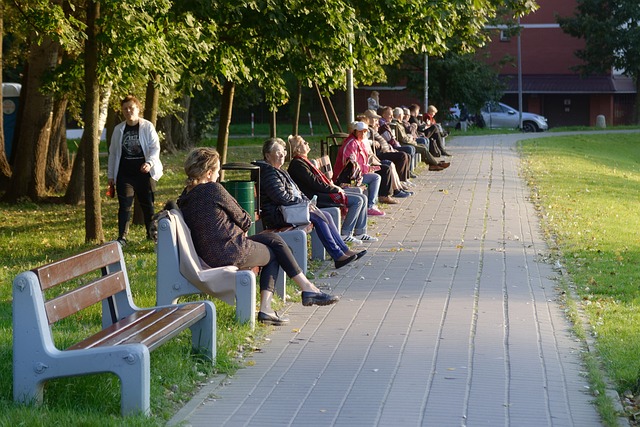Elderly Companion Services are designed to address the nutritional, social, and emotional needs of seniors, particularly those with mobility or cognitive challenges, or who lack a robust support network. These services provide tailored meal plans that cater to individual health needs, taste preferences, and specific dietary restrictions, ensuring proper nutrition as metabolic rates slow and digestive abilities shift. Caregivers offer companionship during meal times, which helps alleviate loneliness and promotes social engagement, a critical aspect for those living in isolation. These services are enhanced by technology that simplifies meal planning and preparation, including smart kitchen devices, and manage meal delivery subscriptions for fresh ingredients and diverse recipes weekly. This holistic approach to mealtime not only ensures safety and enjoyment but also contributes significantly to the overall well-being and quality of life for older adults. Elderly Companion Services are a pivotal support system that enriches the dining experience, making each meal both nutritious and a socially fulfilling event.
Navigating the golden years presents unique challenges, particularly in maintaining a balanced diet and nourishing social connections. This article delves into the multifaceted benefits of Elderly Companion Services, which play a pivotal role in enhancing meal preparation for seniors. We explore nutritional considerations tailored to older adults, the social significance of shared meals, and effective strategies for safe and fulfilling culinary experiences with companion support. Join us as we uncover how these services not only cater to dietary needs but also foster companionship and community among the elderly.
- The Role of Elderly Companion Services in Enhancing Meal Preparation
- Nutritional Considerations for Seniors and How Companions Assist
- Social Aspects of Meal Sharing and Its Impact on the Elderly
- Strategies for Safe and Enjoyable Meal Planning with Elderly Companion Services
The Role of Elderly Companion Services in Enhancing Meal Preparation

Elderly companion services play a pivotal role in facilitating meal preparation for seniors, offering a blend of nutritional support and companionship that addresses both dietary needs and social well-being. These services are designed to assist individuals who may face challenges related to mobility, cognitive function, or the simple lack of a support system. By providing personalized meal planning and preparation, these services help ensure that elderly clients receive balanced and nutritious meals tailored to their specific health requirements and dietary preferences. The presence of compassionate caregivers not only simplifies the logistics of mealtime but also enriches the dining experience by offering conversation and companionship, which can be just as nourishing as the food itself. This aspect is particularly crucial for seniors who live alone or are at risk of social isolation, as it fosters a sense of connection and belonging within the community. The integration of elderly companion services into meal preparation routines thus contributes to an overall improvement in the quality of life for older adults, promoting both health and happiness through the simple act of sharing a meal.
Nutritional Considerations for Seniors and How Companions Assist

For seniors, maintaining a balanced diet is crucial for health and well-being. As metabolism slows with age, nutritional considerations for this demographic become increasingly important. Elderly companion services often assist in meal preparation by providing support tailored to individual dietary needs and restrictions. These services ensure that meals are not only appetizing but also nutrient-dense, incorporating essential vitamins and minerals that can be overlooked as digestive capacities change. Adequate protein intake becomes a priority, as does the consumption of fruits and vegetables rich in antioxidants to support immune function. Moreover, companion services can help monitor fluid intake and manage portion sizes to prevent overeating or undernourishment. This attentive assistance not only supports the nutritional health of seniors but also fosters a sense of companionship and camaraderie during meal times, which is beneficial for both mental and physical health. The presence of a companion can alleviate feelings of isolation and loneliness often associated with aging, making each meal an opportunity for social engagement and enjoyment.
Social Aspects of Meal Sharing and Its Impact on the Elderly

Strategies for Safe and Enjoyable Meal Planning with Elderly Companion Services

When considering meal preparation for seniors, safety and enjoyment are paramount. Elderly Companion Services can play a pivotal role in ensuring that meal times remain a highlight of the day. These services often provide assistance tailored to individual dietary requirements and preferences, fostering an environment where nutritious and satisfying meals can be prepared with ease. A key strategy is to simplify cooking processes by selecting recipes that minimize complex steps, reducing the risk of kitchen mishaps such as burns or cuts. Companions can assist with meal planning, ensuring that ingredients are both safe to handle and appropriate for the senior’s health condition. They can also provide company during meal preparation, making it a social activity rather than a solitary chore. This not only enhances the dining experience but also encourages a balanced diet as meals become more engaging and less of a routine task.
To further promote safe and enjoyable meal planning, Elderly Companion Services can incorporate technology where appropriate. For instance, smart kitchen devices that are voice-activated or have large, easy-to-read displays can make cooking more accessible. Additionally, these services can help set up and monitor meal delivery subscriptions, which deliver fresh, pre-portioned ingredients along with recipes each week. This not only saves time but also offers a variety of culinary experiences without the need for extensive food shopping. By integrating these strategies, Elderly Companion Services can significantly improve the quality of life for seniors by making meal preparation a secure, enjoyable, and fulfilling part of their daily routine.
meal preparation, elderly nutrition, social engagement, companion services, elder care
In conclusion, the act of preparing meals is more than a daily task for seniors; it encompasses nutritional well-being, social interaction, and personal fulfillment. Elderly companion services play a pivotal role in this process, offering tailored assistance that caters to both dietary needs and emotional companionship. By integrating strategies for safe and enjoyable meal planning, these services not only ensure proper nourishment but also foster meaningful connections through the shared experience of mealtime. As we age, maintaining independence and social engagement becomes increasingly important, and elderly companion services are an invaluable resource in achieving this balance. For seniors and their loved ones seeking support with meal preparation, these companion services offer a compassionate and comprehensive solution to enhance quality of life.






